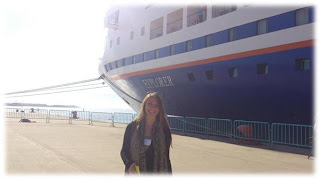Slight detour from reflections from Vietnam – since I am in the middle of mid-term examination period. I have been studying and reading a lot these past days.
Even though I don’t have much access to the news – as one of my assignments, for Global Comparative Leadership class, is to read the news and identify styles of leadership associated with China and its leaders. And, our professor provided us with a series of articles from newspapers of the countries we are visiting issued throughout the voyage.
As I was already talking about, this is the period of my self-discovery – I feel that Semester at Sea is giving me clues and pieces of the puzzle of my life – no joke. Now while doing this assignment, I run into this article below….
~ Chinese firm a candidate for Serbian waterway
Zhao Shengnan
531 words
28 January 2013
China Daily
CHNDLY
12
English
Copyright 2013 China Daily Information Company. All rights reserved.
A Chinese company is likely to be among the top candidates to cooperate with Serbia, as the Balkan country
plans to build a landmark navigable canal, a senior Serbian official said on Saturday.
Analysts said that if it materializes, the move would be an important breakthrough in infrastructure cooperation
between China and Europe, especially as several previous ventures have been aborted by a number of countries.
Of the potential candidates, Chinese businesses have voiced the most interest in the waterway and have
"provided a great deal of unconditional support", said Milan Bacevic, Serbia's minister of Natural Resources,
Mining and Spatial Planning.
He made the remarks shortly after concluding a protocol of understanding with a Chinese company, whose name
he refused to disclose, on the project, which has been dubbed the "Belgrade-Thessaloniki navigable canal" by
local media.
The canal would link Belgrade, the capital of landlocked Serbia, with the port of Thessaloniki in Greece via
Macedonia, by connecting the Danube, Morava and Vardar rivers. The proposed waterway would capitalize on
Serbia's strategic location at the crossroads of central and southeastern Europe.
A feasibility study would follow an initial phase of cooperation. Companies from the United States and Germany
have also expressed interest in the project.
Bacevic emphasized the importance of the Sino-Serbian partnership and China's long experience in waterway
projects. However, he maintained that "the final choice of partner will be decided by assessing each candidate's
strengths and previous performance, rather than where they come from".
"Considering the similarities between the river Vardar and China's Yangtze River, we would like to cooperate with
a company that has experience of water control and building hydropower stations on the Yangtze River," said
Bacevic.
It is estimated that the canal would require investment of $15 billion to $17 billion and would cover an area of
around 10,500 square kilometers - equal to the territory of the autonomous province of Kosovo and Metohija, the
Serbian Tanjug News Agency quoted the minister as saying.
Wei Jinghua, China's former ambassador to Serbia, said the canal would boost Serbia's flagging economy
through job creation and by accelerating its trade via Greece, the country's traditional outlet to the sea.
Economic growth is one of Belgrade's top priorities this year. Serbia's GDP is estimated to have contracted by 2
percent in 2012.
China also has the means to pump capital into Serbia's infrastructure at a time when most countries in
crisis-stricken Europe are unable to do so.
Meanwhile, increasing cooperation with a traditional European partner could provide an opening for Chinese
companies seeking to grow their market share in a continent that has been difficult to access, said Wei.
Jovan Kovacic, president of East-West Bridge, a Belgrade think tank, said China's participation in infrastructure
construction would be a big plus for Serbia. ~
Sino-Serbian relations. The future is to be turning tables on us – and such discoveries make me trust my judgments, as well as to prepare for the decisions I am to make in the near future. After discovering Asia, I am not able to refer to the world as a Western dominated realm. This world is still quite huge, even though globalization makes it seem small. Interconnectedness is another very important factor that should be put into consideration…
I don’t think I will ever stop talking about how valuable SAS and the overall comparative education experience has been so far AND will be in the future… It is the best decision I've made, ever, by far !























